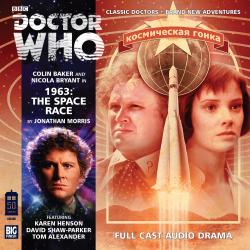1963: The Space Race (Big Finish)
Friday, 8 November 2013 - Reviewed by

1963: The Space Race
Produced by Big Finish
Written by Jonathan Morris
Directed by Nicholas Briggs
Released: October 2013
After an underwhelming debut last month, the 1963 range continues in the midst of Doctor Who’s 50th Anniversary celebrations with its second instalment, The Space Race. Colin Baker’s incarnation takes centre stage this time around, accompanied by his ever-faithful sidekick Peri Brown. Unless there are intricate story arc elements hidden beneath, it appears that the three chapters of this trilogy will be standalone in nature, with its penultimate outing based around the titular international unspoken competition to reach the Moon first in the 1960s.
To writer Jonathan Morris’ immense credit, from the outset this month’s adventure aspires to greater accomplishments than Fanfare for the Common Men did in October. While there are echoes of Doctor Who episodes old and new throughout, The Moonbase and Cold War among them, simultaneously there’s a refreshing sense of narrative innovation as the Doctor and Peri find themselves embroiled in an extraterrestrial conspiracy which could transform the human race. It’s tragic, then, that Morris’ storyline descends into borderline farcical territory in its second half once the tale’s primary antagonist is revealed, all but ruining any dramatic tension evoked by the powerful opening two episodes.
As ever, The Space Race’s central and supporting cast are its primary redeeming assets. Baker’s portrayal is consistently impressive and more well-rounded than the depiction of his incarnation was in its televised form. Nicola Bryant equally gets a deservedly extensive length of time to flex her vocal muscles alongside her regular co-star and the piece’s supporting members. Of the aforementioned ensemble, Karen Henson is the release’s standout highlight as the enigmatic Larinsa Petrov, bettering the performances of her co-stars in adding new layers of emotive depth to a character who could easily have descended into a representational stereotype in the hands of another actress.
Where this particular instalment thankfully doesn’t get bogged down is in its balancing of homages to the past and bold modern storytelling. Fanfare was an all too disappointing reminder of the dangers of overdependence on nostalgia, so if nothing else this reviewer was reassured to see that Morris doesn’t allow his references to the events of 1963 to overshadow the integrity of his core narrative. If The Assassination Games can retain this established balance as it wraps up the 1963 saga, focusing on the homeland political affairs of the 60s through the eyes of the Seventh Doctor, then perhaps all has not been for nought in Big Finish’s celebratory venture.
All the same, it seems nothing less than a crying shame to be terming this project as such after all of its initial promise. Neither Fanfare of the Common Men nor The Space Race have come anywhere close to matching their studio’s best efforts of 2013, and although the latter does admittedly come nearer to attaining the standard fans should expect of 50th Anniversary tie-ins, it’s still a way off from the highs of Starlight Robbery and The Light at the End. Fans of Colin Baker’s Doctor who have thought his incarnation to be underserved in his televised stories will no doubt be thrilled to witness the sixth Time Lord at his best here, but those thrills will soon subside when The Space Race’s promising narrative loses its dramatic impact at its halfway point. I’ve seen a substantial number of colleagues ask where the best entry point into Big Finish’s Doctor Who universe is- while the answer to that question is difficult to clearly define, I can say without reservations that there are far superior places to head first than the 1963 trilogy on the basis of its mediocre second release.







